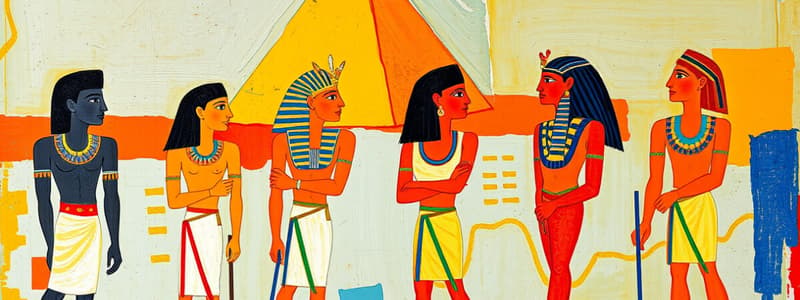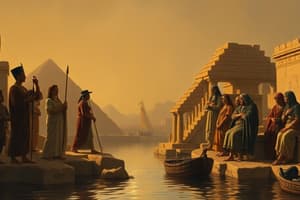Podcast
Questions and Answers
Who was also on the top of the social class pyramid?
Who was also on the top of the social class pyramid?
the pharaoh
Who was on the second to top of the social class pyramid?
Who was on the second to top of the social class pyramid?
government officials
What were some jobs of the government officials in ancient Egypt?
What were some jobs of the government officials in ancient Egypt?
assisted the pharaoh, chief judge, general of army, helped pharaoh make alliances, chief treasurer
What was the daily life like for government officials?
What was the daily life like for government officials?
Why did ancient Egyptians preserve dead bodies through embalming?
Why did ancient Egyptians preserve dead bodies through embalming?
What was one way that someone could move up on the social pyramid?
What was one way that someone could move up on the social pyramid?
What was the job of a scribe?
What was the job of a scribe?
What is the name of the Egyptian writing system?
What is the name of the Egyptian writing system?
Describe the daily life for artisans.
Describe the daily life for artisans.
What was the largest group in the class pyramid?
What was the largest group in the class pyramid?
During the Harvest Season, what reward did peasants receive for a good season?
During the Harvest Season, what reward did peasants receive for a good season?
Describe some of the women's rights in ancient Egypt.
Describe some of the women's rights in ancient Egypt.
What were some of the jobs of the artisans?
What were some of the jobs of the artisans?
Why is a pyramid a good representation of the Egyptian social classes?
Why is a pyramid a good representation of the Egyptian social classes?
List the order of the social classes from the top of the pyramid to the bottom.
List the order of the social classes from the top of the pyramid to the bottom.
Flashcards are hidden until you start studying
Study Notes
Egyptian Social Classes Overview
- The pharaoh was the highest authority in ancient Egyptian society, positioned at the top of the social class pyramid.
- Government officials ranked just below the pharaoh and played crucial roles in administration and governance.
Roles of Government Officials
- Government officials included the chief judge, general of the army, and chief treasurer, responsible for managing alliances and the pharaoh's wealth.
- Their daily lives involved luxury, residing in fine homes and enjoying banquets.
Beliefs and Practices
- Egyptians engaged in embalming as they believed in the afterlife, requiring the preservation of bodies for spiritual needs.
- Social mobility was limited, but becoming a scribe was one pathway to ascend the social pyramid.
Scribes and Their Importance
- Scribes served as official writers and record keepers, essential for administration.
- Hieroglyphics, the form of writing used, comprised over 700 symbols.
Life of Artisans
- Artisans lived in modest conditions and worked ten days at a time before a day off, relying on their employers for food.
- They included various craftspeople, such as carpenters and sculptors.
Peasants and Their Role
- Peasants formed the largest social group, providing agricultural labor.
- During harvest, they worked long hours but could keep leftover grains as a reward for good seasons.
Women's Rights
- Women in ancient Egypt had rights to own property, run businesses, and initiate divorce.
- Some women achieved positions as doctors, government officials, or priestesses.
Social Class Structure
- The social class order from top to bottom: Pharaoh, government officials, priests, scribes, artisans, and peasants.
- The pyramid shape illustrates the hierarchy, with fewer individuals at the top holding greater power and status.
Studying That Suits You
Use AI to generate personalized quizzes and flashcards to suit your learning preferences.




